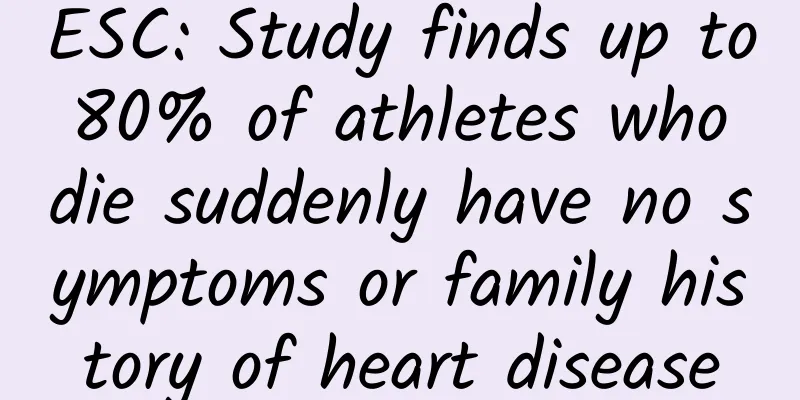ESC: Study finds up to 80% of athletes who die suddenly have no symptoms or family history of heart disease

|
Recently, the European Journal of Preventive Cardiology, a subsidiary of the European Society of Cardiology (ESC), published recommendations on how to use genetic testing to prevent sudden cardiac death in athletes and achieve safe exercise. The author, Dr. Michael Papadakis of St. George's, University of London, said: "Genetic testing for potentially lethal variants is more accessible than ever before, and this document focuses on which athletes should be tested and when. Before undergoing genetic testing, athletes should be counseled about potential results, as it could mean exclusion or restriction from competition." In most cases, clinical evaluation will determine whether preventive treatment, such as a defibrillator, is needed, as well as recommendations regarding exercise and participation in competitive sports. "Even if a genetic abnormality is found, recommendations regarding treatment and return to play often depend on how severe the disorder is clinically. Is it causing symptoms such as fainting? Is the heart excessively weak or thickened? Are many irregular heart rhythms (arrhythmias) seen, and are they worse during exercise? If the answer to any of these questions is 'yes', then it may be necessary to curtail exercise intensity in some way." One example is a genetic disorder that can cause sudden cardiac death in athletes called hypertrophic cardiomyopathy (HCM), in which the heart muscle becomes abnormally thickened. "We used to be very conservative, but now our recommendations are more relaxed. Athletes with HCM should receive a comprehensive clinical evaluation to assess their risk for sudden cardiac death and then be provided an exercise prescription. In most cases, genetic testing for this condition does not impact management. Asymptomatic athletes who are judged to be at low risk may be able to participate in competitive sports after an informed discussion with their physician. Others at higher risk may be restricted to moderate-intensity exercise. Exercise prescriptions should be as specific as possible and outline how often, for how long, at what intensity, and which types of exercise or sports are safe," Dr. Papadakis noted. However, in some cases, genetic testing can dictate management. One example is long QT syndrome (LQTS), which is an inherited electrical malfunction of the heart. Identifying different genetic subtypes (LQT 1-3) can inform the risk of arrhythmias, determine potential triggers to avoid, and help determine medical therapy and plan exercise recommendations. "For example, sudden immersion in cold water is more likely to cause life-threatening arrhythmias in LQT type 1 than in types 2 or 3, so swimmers with the type 1 genetic subtype should be treated more cautiously than runners." The only condition where genetic testing alone might result in exclusion from competition is a heart muscle disorder called arrhythmogenic cardiomyopathy (ARVC). "Even if an athlete has no clinical evidence of the disease but has the gene for it, he or she should abstain from high-intensity competitive sports," Dr. Papadakis said. "That's because studies have shown that people with the gene tend to develop the disease earlier in life if they engage in high-intensity exercise and tend to have more severe disease that can cause life-threatening arrhythmias during exercise." In addition to this, pre-test genetic counseling should be performed to discuss the impact on the athlete and his or her family. As an example, an athlete’s mother is clinically diagnosed with ARVC and has the causative gene, and the athlete is then screened and all clinical tests are normal. The athlete has two options. 1) clinical monitoring, perhaps annually, to check for signs of disease; or 2) genetic testing. "The athlete needs to know that if the test result is positive, it may spell the end of his or her career, even if there is no clinical evidence of disease, and on the other hand, the condition may become worse if genetic testing is refused. Post-test counseling is critical given the potential psychosocial, financial, and mental health impacts, especially if the athlete is excluded from competition." For younger athletes, genetic counseling in a specialized pediatric center with the assistance of a child mental health specialist may be necessary. Dr. Papadakis noted that "the psychological impact of a positive genetic test result on a child can be significant, especially if this leads to exclusion from sports even in the absence of a clinical disorder such as ARVC." In children with a clinical diagnosis of a genetic disorder, genetic testing can confirm the diagnosis and, in some cases, help predict the risk of sudden death during exercise. For example, having a gene for an electrical fault in the heart called catecholaminergic polymorphic ventricular tachycardia (CPVT) may lead to recommendations for preventive therapies, such as beta blockers, and dictate the decision to exercise. "This is important because CPVT predisposes to arrhythmias during exercise and can cause sudden death at a very young age," Papadakis said. In contrast, the timing of genetic testing for children with a family history of HCM is controversial because it rarely causes sudden death in childhood in the absence of clinical symptoms. " From cnBeta.COM |
<<: 8 Keys for Startups to Find the Best Investors
Recommend
Analysis of the four major platforms for hybrid app development
Hybrid App has become a core topic in the mobile ...
Year-end review: Top 10 marketing cases that went viral in 2017
It’s the end of the year again, and it’s time for...
iOS 17.5 official version released, do you want to update?
Early this morning, Apple pushed the official ver...
How can we deliver ads to users who are most likely to spend money?
Every advertiser has this hope: to get the greate...
The "Yellow River Elephant" in the primary school textbook has a "saber-toothed" appearance that is totally unworthy of its name!
In the elementary school Chinese textbook, there ...
Lao Gan Ma said that Tencent has never collected debts? Why didn’t Tencent collect the advertising fees?
Why didn’t Tencent collect the advertising fees? ...
Chinese toon is delicious, but you may be worried about nitrite poisoning! Here's a way to solve it
Another spring has come, and Chinese toon has beg...
Attention! Heavy rain + thunderstorm + hail is coming!
Today (June 14), heavy rainfall continues in the ...
Working is actually a hundred times harder than starting a business
In fact, I really hate topics like entrepreneursh...
How far are traditional TV brands from experiencing the "Nokia tragedy"?
Even though Ma Huateng once publicly promised tha...
Why is Panzhihua famous for mangoes? The dry and hot valley of the Jinsha River is a tropical fruit producing area in the subtropics
Although located in the subtropics, Panzhihua is ...
What to wear to keep cool in summer? Of course, it's the "shroud"!
Flax (Linum usitatissimum) is a herbaceous plant ...
It's outrageous to be cut by tulips
What is more likely to be disillusioned than Deng...
Waymo CEO says Tesla doesn't have self-driving, Musk hits back: "Better than you"
Recently, Waymo CEO John Krafcik said in an inter...
iOS 7 exposed the latest vulnerability, unlocking in as fast as 5 seconds
Some users have discovered the latest lock screen ...









